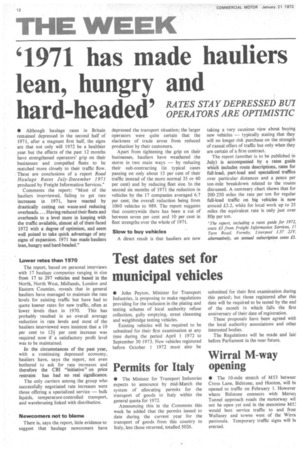'1971 has made hauliers lean, hungry and
Page 14

If you've noticed an error in this article please click here to report it so we can fix it.
hard-heade 9 RATES STAY DEPRESSED BUT d OPERATORS ARE OPTIMISTIC • Although haulage rates in Britain remained depressed in the second half of 1971, after a stagnant first half, the signs are that not only will 1972 be a healthier year but the effects of the past 12 months have strengthened operators' grip on their businesses and compelled fleets to be matched more closely to their traffic flow. , These are conclusions of a report Road Haulage Rates July-December 1971 produced by Freight Information Services.*
Comments the report: "Most of the hauliers interviewed, failing to get rate increases in 1971, have reacted by drastically cutting out waste and reducing overheads. . Having reduced their fleets and overheads to a level more in keeping with the traffic available, almost all of them faced 1972 with a degree of optimism, and seem well poised to take quick advantage of any signs of expansion. 1971 has made hauliers lean, hungry and hard-headed."
Lower rates than 1970 The report, based on personal interviews with 17 haulage companies ranging in size from 17 to 297 vehicles and based in the North, North West, Midlands, London and Eastern Counties, reveals that in general hauliers have managed to maintain the rate levels for existing traffic but have had to quote keener rates for new traffic, often at lower levels than in 1970. This has probably resulted in an overall average reduction in rate levels and most of the hauliers interviewed were insistent that a 10 per cent to 121 per cent increase was required now if a satisfactory profit level was to be maintained.
In the circumstances of the past year, with a continuing depressed economy, hauliers have, says the report, not even bothered to ask for rate increases and therefore the CBI "initiative" on price restraint has had no real significance.
The only carriers among the group who successfully negotiated rate increases were those offering a specialized service — bulk liquids, temperature-controlled transport, and warehousing linked with distribution.
Newcomers not to blame There is, says the report, little evidence to suggest that haulage newcomers have depressed the transport situation; the larger operators were quite certain that the slackness of trade arose from reduced production by their customers.
Apart from tightening the grip on their businesses, hauliers have weathered the storm in two main ways — by reducing their sub-contracting (in typical cases passing on only about 15 per cent of their traffic instead of the more normal 35 or 40 per cent) and by reducing fleet size. In the second six months of 1971 the reduction in vehicles by the 17 companies averaged 6.7 per cent, the overall reduction being from 1060 vehicles to 989. The report suggests that countrywide there has been a cut of between seven per cent and 10 per cent in fleet strengths over the whole of 1971.
Slow to buy vehicles A direct result is that hauliers are now taking a very cautious view about buying new vehicles — typically stating that they will no longer risk purchase on the strength of casual offers of traffic but only when they are certain of a firm contract.
The report (another is to be published in July) is accompanied by a rates guide which includes route descriptions, rates for full-load, part-load and specialized traffics over particular distances and a pence per ton-mile breakdown related to the routes discussed. A summary chart shows that for 200-250 miles the rate per ton for regular full-load traffic on big vehicles is now around £.3.2, while for local work up to 25 miles the equivalent rate is only just over 80p per ton.
The report, including a rates guide for 1972, costs IV from Freight Information Services, 12 Tarn Road. Formby, Liverpool L37 2TY, alternatively, an annual subscription costs £5.










































































































